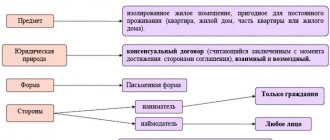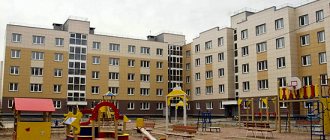Read our article about ways to exchange a privatized apartment. You can also find out how to file a claim in court for the exchange of residential premises on our website.
Forced exchange of municipal housing space through the justice authorities: practice in our article.
In what cases can you forcefully exchange an apartment received under a social tenancy agreement?
A social tenancy agreement is a document under which you live with your family in a municipal apartment and use it.
It is concluded with you by an authorized body, which is called the landlord. In Moscow, this is, as a rule, the Department of City Property of the City of Moscow. In other regions - a body with similar powers and competence. You are the second party to the contract, the tenant of the apartment. All others living with you are members of your family. They must be specified in the social tenancy agreement.
Read our article about who can be considered family members of an apartment tenant
How to evict an absent family member from a municipal apartment? More details
The law allows for the possibility of exchanging an apartment without going to court.
For details about when, how and under what conditions this can be done, read our article
When and how can I exchange an apartment received under a social tenancy agreement? More details
The second option is a forced exchange of apartments. It is carried out only in court. That is, in order to exchange, filing a claim in court and further proceedings are required.
A forced exchange is possible if you, as the tenant of the apartment, were unable to agree on its exchange with your family members. We are talking about those who live with you and those who are temporarily absent from it. And also about former members of your family who remained living in your apartment.
POSITION OF THE SUPREME COURT OF THE RF. When exchanging residential premises, it is necessary to obtain the consent of the former family member of the tenant in the form prescribed by law. (Paragraph 29 of the Resolution of the Plenum of the Supreme Court of the Russian Federation dated July 2, 2009 N 14 “On some issues that arose in judicial practice when applying the Housing Code of the Russian Federation”)
To find out who can be considered a former family member of an apartment tenant, read our article
How to evict an absent family member from a municipal apartment? More details
So if you do not have consent to the exchange from at least one member of your family from those we named above, a forced exchange of an apartment through the court is the only option for resolving the issue of exchange.
Grounds and reasons
As a rule, the reasons for exchanging a non-privatized apartment through the court are: domestic disagreements, systematic quarrels between residents.
Also, if one of the cohabitants deliberately harms others - he acts as a hooligan or leads an antisocial lifestyle, making the lives of others unbearable (or even jeopardizing them).
At the same time, a compromise regarding travel in the household has not been reached and someone is actively opposed (or the landlord has already vetoed it).
You can learn from our articles about whether it is possible to exchange an old home for a new building, a room for a house and a plot of land, and how to do the exchange correctly with an additional payment.
Who can demand a forced exchange of an apartment?
You can file such a claim as the tenant of the apartment or any member of your family who lives with you.
POSITION OF THE SUPREME COURT OF THE RF. According to the rules of claim proceedings, cases on claims by family members of the tenant living with him for the forced exchange of residential premises are considered and resolved, if an agreement on the exchange has not been reached between the tenant and his family members. (Clause 34 of the Resolution of the Plenum of the Supreme Court of the Russian Federation dated July 2, 2009 N 14 “On some issues that arose in judicial practice when applying the Housing Code of the Russian Federation”)
It happens that a minor child and a citizen who has been deprived of parental rights in relation to him live in an apartment at the same time. In this case, the legal representatives of the minor, the guardianship and trusteeship authority or the prosecutor can file a claim for forced exchange of the apartment. This can only be done if the cohabitation of a minor and the above-mentioned citizen violates the rights and interests of the child.
What is a compulsory procedure?
Forced exchange of residential premises is the exchange of living space by court order between persons living in the same territory. The transaction is regulated by Art. 72 Housing Code of the Russian Federation.
Causes
The reason for the exchange and filing an application with the court may be:
- disagreement of residents or the municipality with the transaction;
- divorce;
- requirements of adults for separate living space.
The main reason for going to court is the inability to live together due to poor family relationships.
Which municipal housing can be forcibly exchanged and which cannot?
Only municipal non-privatized housing can be forcibly exchanged . In some cases, it is impossible to make a forced exchange (Article 73 of the RF Housing Code). This is due to the characteristics of the room itself:
- The apartment or house in which it is located is subject to major repairs or redevelopment in the near future.
- The housing is considered unsafe and the house is subject to demolition.
In addition to the housing assessment, the reason for refusing an exchange through the court may be the termination of a social tenancy agreement. If the municipality is going to terminate the contract soon, there can be no talk of any exchange.
Important! An exchange is impossible if as a result of it a citizen suffering from a severe chronic disease from the List moves into the residential premises.
What can you do?
A municipal apartment can only be exchanged for such types of housing that comply with:
- Standards for living space sizes.
- Sanitary standards for residential premises.
- Interests of minor children.
- Interests of citizens with disabilities and serious illnesses.
When selecting options for exchange, the main factor becomes the preservation of normal living conditions for all members of the transaction.
Trial
After filing a claim for the exchange of social housing, a lengthy legal process will begin with the participation of all parties. For each claim, its own place of consideration and trial is established. In the case of a forced exchange of municipal housing, you should apply to the court of general jurisdiction for the territorial location of the property.
To file a claim, the tenant of a social apartment will need:
- Statement of claim.
- Social tenancy agreement.
- Residents' consent to resettlement (if received).
- Consent of the municipality (if received).
- Certificate of all persons registered in the apartment.
- Certificates of absence of debts for utility services.
- Floor plans.
- Divorce certificate or other materials that explain the reason for the exchange request.
Depending on each specific case, the package of documents may be changed.
The statement of claim states:
- Name of the judicial authority.
- The title should be “Statement of Claim for the forced exchange of a non-privatized apartment.”
- Full name, address and passport details of the plaintiff.
- A short summary of the requirements with links to articles of the RF Housing Code.
- Information about other residents.
- List of attached documents.
- Date and signature.
We do not recommend completing the documents yourself. Save time - contact our lawyers by phone:
8 (800) 302-76-94
The state fee when going to court is 300 rubles . After submitting the application and all necessary documents to the court, a decision will be made within 30 days.
Who will you have to sue?
If you filed the claim as a tenant of the apartment, name your family members who live with you as defendants.
How to choose a lawyer? More details
If, on the contrary, they go to court, you, the tenant of the apartment, will be the defendant.
Depending on the content of the claim, you can indicate as a co-defendant the landlord, who is specified in your social tenancy agreement. Let us recall that in Moscow, this is, as a rule, the Department of City Property of the City of Moscow. In other regions - a body with similar powers and competence.
In some cases, the landlord may be the only defendant in the claim.
So the number and composition of defendants directly depends on the specific circumstances of the case.
What are the chances of winning in court?
The chances of forced exchange of apartments received by you and another tenant under a social tenancy agreement are high. Provided that you can prove the following:
- You live in the apartment permanently and are registered in it at your place of residence.
- There is a basis for the forced exchange of apartments. This means that it was not possible to reach an agreement on the exchange between you, as the tenant of the apartment, and your family members.
- You have received the consent of the guardianship and trusteeship authority to exchange apartments (if required).
- During the exchange, the total area of the apartment for each family member who will move into it as a result of the exchange will not become less than the accounting norm.
- The exchange does not violate the rights and legitimate interests of you and your family members.
Is it possible to exchange?
You got on the waiting list for social (municipal) housing, collected all the necessary certificates, waited the required amount of time and finally received the coveted apartment. What to do if the place of residence provided does not live up to expectations?
The legislation of the Russian Federation does not prohibit the exchange of non-privatized municipal housing (Article 72 of the Housing Code of the Russian Federation), but registration will require a lot of effort and time.
Important! If the apartment belongs to the flexible fund, is official or specialized, its exchange is impossible before privatization.
The exchange procedure has many pitfalls - they begin with the search for a suitable option for exchange, which is also municipal housing and assumes a similar area. Obtaining the consent of all persons who live in the apartment and the landlord is also not always easy - if one of the family members refuses, you will have to go to court for a forced exchange procedure.
There are also nuances regarding counter real estate:
- The exchange of non-privatized municipal housing for non-privatized housing is available to everyone . To do this, it is necessary to select an alternative that is suitable in all respects and obtain the written consent of the landlord and all family members living on the premises.
- It is impossible to exchange non-privatized housing for privatized housing . Article 72 of the Housing Code of the Russian Federation establishes that exchange between apartments can only occur in the case of the same form of ownership.
What nuances to consider when filing a claim?
Point 1. Formulate your claims correctly.
The main requirement that should be stated in the claim is the forced exchange of apartments.
You can find more complete information on the topic in ConsultantPlus. Free trial access to the system for 2 days.
Moreover, it is necessary to clearly indicate the addresses and characteristics of the apartments that are supposed to be exchanged. The exchange option you offer must be specific.
EXAMPLE FROM JUDICIAL PRACTICE. The law does not provide the court with the opportunity to independently determine (select) an apartment for forced exchange (Appeal ruling of the Moscow City Court dated January 14, 2019 in case No. 33-743/2019).
Additionally, you can ask the court to terminate your social tenancy agreement and a similar agreement that the second tenant has - the owner of the apartment into which you want to move as an exchange. Usually, this requires concluding new social rental agreements: with you - for another apartment, with another tenant - for yours.
It is permissible to include in the claim a demand to oblige the Moscow City Property Department to conclude an agreement on the exchange of apartments
You can also demand recognition that it is impossible for you to live together with family members. And also apply for deregistration of the defendant.
Point 2: File the claim against the proper defendant.
As a general rule, this is the tenant of the apartment, or a member of his family who lives with him, or the landlord.
Please note: the defendant cannot be the tenant of the apartment into which you plan to move as an exchange, or members of his family.
Nuance 3. Attach to the claim documents that confirm the consent of the tenant of the apartment into which you want to move as an exchange, and his family members to the exchange.
Consent is given in any form and is documented in writing. If desired, you can have it certified by a notary.
Point 4. As the reason for filing the claim, indicate that you could not reach an agreement on the exchange with your family members.
This is a mandatory condition for the court to consider a case of forced exchange of apartments and make a decision on it.
Also justify why your further cohabitation with the defendant in the same apartment is impossible. Refer to hostile, conflictual relationships, lack of mutual assistance, support, joint household, obstructions in your use of the apartment, living in it. Point out that you are actually different families.
EXAMPLE FROM JUDICIAL PRACTICE. The court refused to make a positive decision on the claim for forced exchange of apartments. The citizen indicated that living together in an apartment with the defendant had become impossible due to incompatibility of characters and views, differences in life positions, lack of mutual understanding, loss of respect and trust, and financial disagreements. The court rejected these arguments. This is an optional feature in which the court is obliged to exchange residential premises (Determination of the Moscow City Court dated April 18, 2019 No. 4g-4440/19).
Housing exchange algorithm
Selection of options for exchanging housing with another citizen of the Russian Federation
If you don’t have your own options, you should contact the landlord with whom you previously entered into a social rental agreement and ask him.
The following bodies can act on behalf of the lessor in Russia:
- Ministries (departments and services) of the constituent entities of the Russian Federation and Russia itself, which have residential premises at their disposal that can be provided to citizens under a social tenancy agreement.
- Local municipal authorities, which manage the residential premises of the municipal housing stock and provide them to citizens under a social tenancy agreement.
After submitting an application to the landlord for the exchange of residential premises under a social tenancy agreement, wait for a decision to be made and, if the outcome is positive, draw up a new agreement.
The landlord, for his part, undertakes to review the applications and select the desired residential premises (if any).
Concluding a housing exchange agreement
The subject of such an agreement is residential premises, which are provided to citizens under a social rental agreement; the subjects of exchange are the tenants of social housing.
Current legislation does not provide for the possibility of exchanging residential premises that belong to the social use fund for housing from a specialized commercial use fund.
The agreement must be signed by the parties and drawn up in writing. In this case, registration with Rosreestr is not required.
Documents can be submitted either in person or by mail.
Be sure to attach a copy of the applicant’s identity document to your application or present your passport when handing over documents in person.
After handing over the documents, the landlord will give you a receipt confirming receipt of the documents. Within ten working days from the date of receipt of the package of documents and application, you will be notified of the decision made. Consent or refusal will be made in writing and delivered personally to the applicant.
We have written how to correctly register ownership of an apartment in a new building. You will learn how to allocate a share from common property in our feature article. You can find out how to take the extract you need from the house register in the material at the link.
How to increase your chances of winning in court
First, make sure that yours and the other apartment you intend to move to in exchange meets the requirements of the exchange law.
Both apartments must be registered under social tenancy agreements. Contracts must be valid.
Also, both apartments must be suitable for living. That is, comply with sanitary, technical rules and regulations, as well as other legal requirements.
For more information about all the requirements for your apartment and for the one you want to receive in exchange, read our article
When and how can I exchange an apartment received under a social tenancy agreement? More details
Secondly, check that there are no conditions under which the apartment cannot be exchanged.
They are clearly stated in the law. The list of such conditions (grounds) is exhaustive. These are the same grounds on which a landlord may refuse to agree to exchange an apartment out of court.
For details about all the conditions (grounds) under which you cannot exchange an apartment, read our article
When and how can I exchange an apartment received under a social tenancy agreement? More details
If there is at least one of the conditions under which exchange is prohibited, the court will reject your claim and make a decision in favor of the defendant.
Thirdly, carefully prepare the evidence base. That is, documents that confirm your right to demand a forced exchange of municipal apartments, and the grounds for such an exchange.
So, you will need to present to the court:
1) documents that confirm the legality of your residence in the apartment.
This is a social rental agreement that you once concluded with an authorized body (usually the Moscow City Property Department) as a tenant. Or in which you are registered as a member of his family.
How long will it take for the trial Read more
2) documents that confirm your permanent registration in the apartment.
First of all, this is a copy of your passport with a registration mark. As well as data from the passport office, a financial personal account opened for you, extracts from the house register, a certificate of verification of living conditions or a certificate of actual residence and other housing documents.
3) documents that confirm that there is consent of the guardianship and trusteeship authority for the exchange of apartments (if it was required).
You need to obtain such consent if a minor, incompetent or partially capable person lives in your apartment. Or several such citizens.
4) documents that confirm that during the exchange, the total area of the apartment for each family member who will move into it as a result of the exchange will not become less than the accounting norm.
NOTE. The accounting standard for housing area is established by the local government body. In Moscow, it is 10 square meters of living space for individual apartments. And 15 square meters - for apartments that were provided by decisions of the authorized executive authorities of the city of Moscow to various families (Moscow Law of June 14, 2006 N 29 “On ensuring the right of Moscow residents to residential premises”).
5) documents that confirm that the exchange does not violate the rights and legitimate interests of you and your family members.
The law does not indicate when they can be considered violated and when not.
When considering claims for forced exchange of apartments, courts take into account all the circumstances of the case. They also take into account the arguments and interests of the people who live in the apartment with you.
For example, that there are circumstances that hinder them due to age, health, place of work, study, etc. use the apartment into which you plan to move as an exchange.
POSITION OF THE SUPREME COURT OF THE RF. It happens that a dispute about the exchange arose between former family members who occupy a separate apartment. If one or more of them do not agree to move to a living space located in a communal apartment, this is not a reason to refuse to satisfy the claim. After all, when a family breaks up, due to which an exchange is necessary, these individuals no longer actually use a separate apartment. (Paragraph 34 of the Resolution of the Plenum of the Supreme Court of the Russian Federation dated July 2, 2009 N 14 “On some issues that arose in judicial practice when applying the Housing Code of the Russian Federation”)
So your main task is to prove that after the exchange you and your family members will live in the same conditions as now, or even better. To confirm this, bring any documents to court.
EXAMPLE FROM JUDICIAL PRACTICE. The citizen demanded a forced exchange of the apartment, but the court refused to do so. The citizen had to prove that when exchanging the apartment according to the option he proposed, the property, material and social rights of the defendant would not be violated. But he did not present such evidence to the court (Determination of the Moscow City Court dated April 18, 2019 No. 4g-4440/19).
What are the pitfalls?
We advise you to consider the following points, which may possibly affect the outcome of the case.
First. You are not required to serve a pretrial demand on the defendant before going to court.
The law does not oblige you to do this, and the court does not have the right to demand confirmation that you approached the defendant with a pre-trial claim. So there is no need to send it to the defendant.
But if you did do this (for example, sent a pre-trial claim by registered mail), present it to the court. Also include evidence that the defendant received this request. If he responds to your appeal, for example, with a written refusal, present him to the court as well.
EXAMPLE FROM JUDICIAL PRACTICE. Before filing a claim for forced exchange of apartments, the citizen repeatedly offered the defendant to voluntarily exchange the apartment in which they live together under a social tenancy agreement. But the defendant refused such a proposal (Determination of the Moscow City Court dated April 18, 2019 No. 4g-4440/19).
Second. There are no territorial restrictions on the exchange of apartments.
In addition, the exchanged apartments must be located on the territory of the Russian Federation. They can be located in the same or in different localities.
Third. The exchange is carried out without limiting the number of participants.
But at the same time, it is necessary to comply with the condition that the total area of the apartment for each family member who moves into it as a result of the exchange does not become less than the accounting norm.
Fourth. Courts very rarely make decisions in cases of forced exchange of apartments in favor of the citizen who filed such a claim.
Most decisions in these cases are rejected.
When can the court refuse a claim?
When going to court, keep in mind that under certain circumstances it may decide in favor of the defendant. This is possible if:
- You did not indicate which apartment you want to exchange yours for.
EXAMPLE FROM JUDICIAL PRACTICE. The court refused to make a positive decision on the claim in which the citizen asked for a forced exchange of his apartment. After all, he did not select and present options for exchanging an apartment with another tenant (Appeal ruling of the Moscow City Court dated September 30, 2019 in case No. 33-39826/2019).
- Your and (or) another apartment to which you intend to move in exchange does not meet the requirements of the exchange law.
For more information about all the requirements for your apartment and for the one you want to receive in exchange, read our article
When and how can I exchange an apartment received under a social tenancy agreement? More details
- You did not obtain the consent of the guardianship and trusteeship authority, although it was required.
For example, because minor children live with you in the apartment you intend to exchange.
- In your situation, one or more conditions are met under which the exchange of apartments is impossible.
For details about all the conditions (grounds) under which you cannot exchange an apartment, read our article
When and how can I exchange an apartment received under a social tenancy agreement? More details
- As a result of the exchange, the living conditions of yours or your family members worsen, and their rights and interests are violated.
We can talk about this when, for example, the proposed residential options are not equivalent to the apartment you are currently using. Let’s assume that the size of the living and common area in the new apartment per each member of your family will become less than the size of the area per them in the current apartment.
EXAMPLE FROM JUDICIAL PRACTICE. The citizen demanded through the court to forcefully exchange the apartment in which he lives with the defendant. The court refused to do this. After all, the citizen proposed to move the defendant to an apartment located within the territorial boundaries of the Moscow region. And this will significantly worsen the position of the defendant compared to the citizen who filed the claim (Determination of the Moscow City Court dated April 18, 2019 N 4g-4440/19).
Another option is a deterioration in the living conditions themselves. For example, when a new apartment does not have a balcony, a garbage chute, a landline telephone, or an elevator, which are available in your current home.
The type of building in which the new apartment is located, its number of floors, the year of construction, and the availability of amenities also matters. Thus, the defendant’s move from a house with comfortable living conditions to a three-story brick house with wooden floors of a much earlier year of construction, which needs repairs, indicates a deterioration in the defendant’s situation. The same applies to emergency and dilapidated housing.
Also, the deterioration of living conditions confirms that the new apartment is located at a considerable distance from kindergartens, schools, sections, clinics and other similar facilities. This is especially important if your family includes a minor.
EXAMPLE FROM JUDICIAL PRACTICE. The court decided on the claim for forced exchange of apartments in favor of the defendant. The exchange will worsen his living conditions, material rights and social well-being (Appeal ruling of the Moscow City Court dated January 14, 2019 in case No. 33-743/2019).
Transactions between homeowners
With surcharge
The procedure for exchanging apartments with an additional payment can be completed in two ways:
- With the help of two counter purchase and sale agreements.
- Using an exchange agreement, which fixes the amount of additional payment.
The last circumstance is extremely important. The barter agreement itself does not imply that one of the participants will transfer to the other not only property, but also money (Part 1 of Article 568 of the Civil Code of the Russian Federation). Therefore, if you do not specify this point in the contract, you will have to go to court and seek termination of the transaction. The likelihood of collecting unpaid money is extremely low.
Legal exchange with an additional payment is possible only in relation to privatized or initially private apartments. You can’t change municipal housing like that.
No additional fees
In the case where the owners consider the apartments to be of equal value, the exchange agreement is carried out without additional payment. In this case, the parties only need to correctly indicate all the essential points in the contract and register the transfer of ownership in Rosreestr.
The essential points of such an agreement are:
- Full names and addresses of participants.
- Description of the exchanged housing: area, address, cadastral number, cost.
- Moment and procedure for transfer of housing.
- Signatures of the parties.
If necessary, the contract also fixes additional points - in particular, those relating to the rights and obligations of the parties to the transaction.
Attention: The transfer of apartments must be carried out by signing a transfer deed. It is an integral part of the contract both in the case of barter and purchase and sale.
Features of real estate agreements between relatives
According to the Civil Code of the Russian Federation, the barter agreement does not imply any additional conditions if the parties to the transaction are relatives. However, tax legislation introduces its own nuances. According to Art. 217 of the Tax Code of the Russian Federation, in transactions involving real estate, a tax of 13% of the cost of housing is paid. However, gift transactions concluded between close relatives are exempt from such tax.
That is why, if the participants in the exchange are relatives of each other, then it makes sense, instead of a purchase and sale or an exchange agreement, to use two gift agreements, according to which the parties give their housing to each other. This option, of course, requires high trust between the exchange participants, but significant savings are evident.
On our website there are other useful articles devoted to the process of exchanging real estate such as:
- residential buildings;
- apartments located in different localities;
- land plots, as well as the rules for drawing up an agreement for such transactions;
- housing exchanged for vacation periods;
- Lease and various real estate exchanged for a car.











